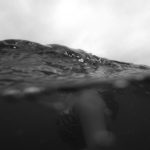Would you help a swimmer in distress?
In our previous newsletter we asked, “how safe does it have to be before we can swim?” The topic generated some interesting feedback. If you want to join the discussion, please leave your comments here, or post something on our Facebook page (and please take a moment to ‘Like’ us on Facebook if you haven’t done so already).
The question for this week is, “would you help a swimmer in distress?” We’d all like to say, “yes, of course, without hesitation.” But how certain of this can we be? Let’s imagine some scenarios.
Say you’ve been training for months and are now taking part in your first ever open water swim, nearing the finish. Your friends and family are watching and you’ve a lot of personal pride, and a good dollop of sponsorship cash, dependent on you making it over the line. It’s a struggle, you’re tired, but you think if you keep plugging away you’ll make it. A swimmer next to you stops suddenly and rolls onto their back. Do you:
1) Keep going. If you stop now you’ll never make it, and besides there are plenty of other people around.
2) Keep going. You can inform a marshal when you reach the finish and they can send help.
3) Stop and assess the situation, being prepared to give up your goals if the other swimmer needs your assistance?
You all said “3”, of course.
What if we raise the stakes a little. Say you’re racing your training partners and you’re in front? There’s nothing more important than beating your friends, right? Or what if there are prizes on offer, or cash, world championship points or even an Olympic medal? You could have spent 20 years training for this once-in-a-lifetime shot at glory? Would you give all that up? Surely someone else can take care of it. That’s what the safety crew are for.
The other day I went to an assembly at a local school about the Olympics. The children shared some Olympic stories that had inspired them. One of them was about Canadian sailor Lawrence Lemieux.
Competing in the 1988 Olympics in Korea, Lemieux was lying in second place when weather conditions worsened suddenly and two Singaporean sailors from another race we thrown into the water. Lemieux saw the two men were injured and unable to right their craft, so he broke away from his race and went to the rescue. He waited until the two were transferred to an official patrol boat before returning to his own race, in which he finished 22nd.
Having had to stop with cramp during a race once I know from experience that it can take time to attract the attention of the safety crew. If you’re wearing a wetsuit that’s keeping you afloat and it’s only cramp, it’s not a big drama. But what if someone has an asthma attack or heart failure and can’t shout for assistance. Seconds can make a difference.
If everyone in open water swimming is looking out for everyone else we’ll all be safer and be able to swim more confidently. It’s a message we’d like to share with all open water swimmers. If lives are at stake, then finishing times, points and medal are insignificant.
The International Olympic Committee awarded Lemieux the Pierre de Coubertin Medal for Sportsmanship and people still recount his story 24 years later. Unless you’re an ardent sailor it’s unlikely you’d recognise any of the medal winners.






